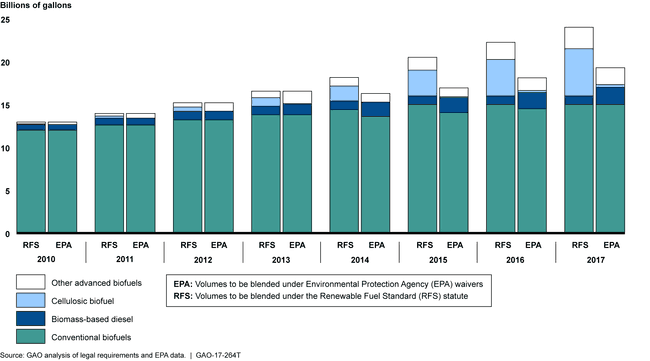Renewable Fuel Standard: Program Unlikely to Meet Production or Greenhouse Gas Reduction Targets
Fast Facts
The Renewable Fuel Standard aims to reduce greenhouse gas emissions and expand the nation’s renewable fuels sector through 2022. It requires that transportation fuels (such as gasoline and diesel) sold in the U.S. contain annually increasing amounts of conventional renewable fuels (such as ethanol) and advanced biofuels (such as cellulosic biofuel). Advanced biofuels can reduce greenhouse gas emissions by at least half compared to petroleum-based fuels.
However, we testified that it is unlikely that the goals of the RFS will be met because production of advanced biofuels is limited, as is the potential for expanding their production by 2022.
Volumes of All Biofuels to Be Blended into Domestic Transportation Fuel, as Set by the Renewable Fuel Standard Statute and by EPA, 2010 through 2017

Bar graph showing increasing amounts of biofuels to be blended into the transportation supply.
Highlights
What GAO Found
It is unlikely that the goals of the Renewable Fuel Standard (RFS)—to reduce greenhouse gas emissions and expand the nation's renewable fuels sector while reducing reliance on imported oil—will be met as envisioned because there is limited production of advanced biofuels and limited potential for expanded production by 2022. Advanced biofuels, such as cellulosic ethanol and biomass-based diesel, achieve greater greenhouse gas reductions than conventional biofuels (primarily corn-starch ethanol), but the latter account for most of the biofuel blended into domestic transportation fuels under the RFS. As a result, the RFS is unlikely to achieve the targeted level of greenhouse gas emissions reductions. For example, the cellulosic biofuel blended into the transportation fuel supply in 2015 was less than 5 percent of the statutory target of 3 billion gallons. Partly as a result of low production of advanced biofuels, the Environmental Protection Agency (EPA), which administers the RFS in consultation with other agencies, has reduced the RFS targets for such fuels through waivers in each of the last 4 years (see figure). According to experts GAO interviewed, the shortfall of advanced biofuels is due to high production costs. The investments required to make these fuels more cost-competitive with petroleum-based fuels, even in the longer run, are unlikely in the current investment climate, according to experts.
Volumes of All Biofuels to Be Blended into Domestic Transportation Fuel, as Set by the Renewable Fuel Standard Statute and by EPA, 2010 through 2017

Why GAO Did This Study
Since 2006 the RFS has required that transportation fuels—typically gasoline and diesel—sold in the United States be blended with increasing volumes of biofuels to meet environmental and energy goals. Annual targets for the volumes of biofuels to be blended are set by statute. EPA is responsible for adjusting the statutory targets through 2022 to reflect expected U.S. industry production levels, among other factors, and for setting volume targets after 2022. Biofuels included in the RFS are either conventional (primarily corn-starch ethanol) or advanced biofuels (e.g., cellulosic ethanol and biomass-based diesel). Advanced biofuels emit fewer greenhouse gases than petroleum-based fuels and corn-starch ethanol.
In November 2016, GAO issued two reports on the RFS. This testimony is based on those two reports: GAO-17-94 and GAO-17-108. It provides information on whether the RFS is expected to meet its production and other targets, as well as expert views on any federal actions that could improve the RFS framework, among other things.
For the reports on which this testimony is based, GAO analyzed legal requirements and EPA data. In addition, GAO worked with the National Academy of Sciences to convene a meeting of experts from industry, academia, and research organizations in May 2016. GAO also contracted with the National Academy of Sciences for a list of experts on issues related to the RFS. Further information on how GAO conducted its work is contained in the reports.
For more information, contact Frank Rusco at (202) 512-3841 or ruscof@gao.gov.
